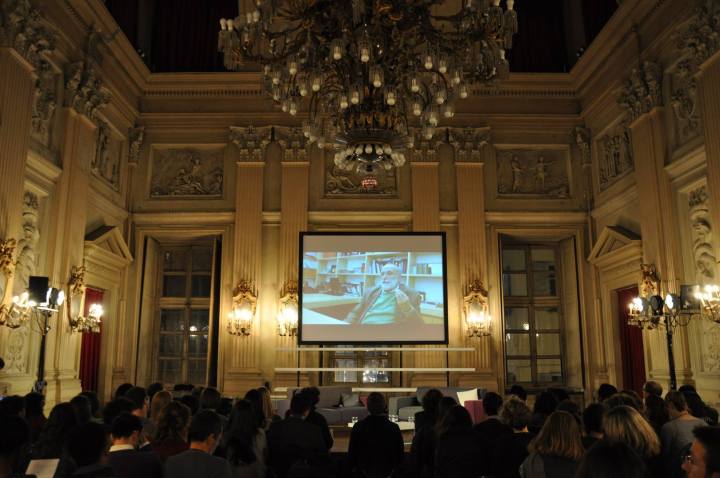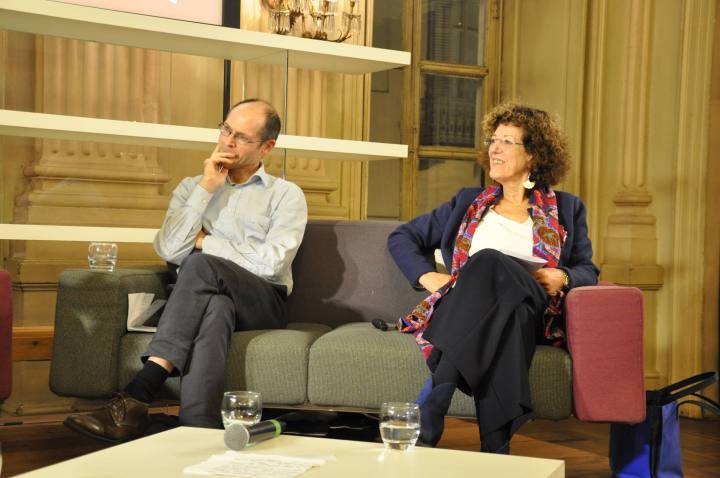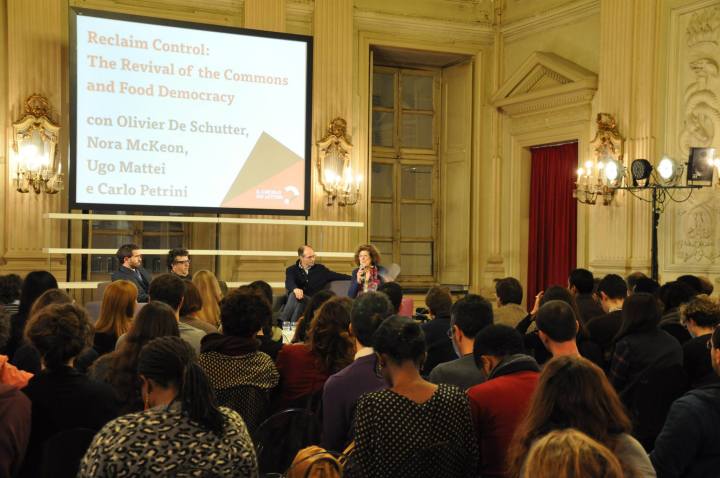
On January 26th, 2017 the inauguration of the new Master of Research in Food Law and Finance of the International University College of Turin (IUC) filled the tremendously beautiful Circolo dei Lettori, located in an old Palazzo of the 18th century. The attendance was such that people had to stand to be able to hear the speeches of Olivier De Schutter (former UN Special Rapporteur on the Right to Food), Nora McKeon (Civil Society Mechanism of the FAO), Ugo Mattei (IUC and University of Turin) and Carlo Petrini (Slow Food, whose intervention had been recorded).
For almost two hours, the four speakers (who are the members of the Scientific Committee of the new Master) engaged in a passionate and thought provoking conversation around “Reclaiming Control: The Revival of the Commons and Food Democracy” and addressed the pressing issues that are related to current the food system, in which food is considered a commodity susceptible of appropriation by an elite.
The night was moderated by Dr Tomaso Ferrando (Warwick University) who first invited the Assessora all’Ambiente della città di Torino Stefania Giannuzzi to take the floor. She welcomed the Master on behalf of the local authorities as an initiative in tune with the city’s current efforts to create a local food policy, and as a precious source of innovative thinking on the food system and its democratization for the city itself. Then, Tomaso presented the Master and the IUC by recalling some of the data that characterize this academic project: in the last decade, more than 300 students from 66 countries and the five continents attended the IUC, and more than 40% of these alumni are now engaged in PhD programmes all over the word, therefore furthering the critical thinking, or have worked for prestigious UN agencies. The Master, co-organized with the University of Gastronomic Sciences of Pollenzo, represents an opportunity to strengthen the connection between Turin and the international world, and to form a new generation of citizens, academic and professionals aware of the complexity of the food system, capable of addressing those aspects that are often invisible and equipped with the tools to address the root causes of food poverty, climate change and inequality in access to nutritious food.

Nora McKeon opened the core of the night. She stressed the need for authorities to recognize and support the initiatives of people taking back control of their food system in each part of the world. Her speech was focused on Africa, where countries have too long been plundered by Northern interests through colonialism, food aid, development programmes, and now trade and investment agreements. She showed evidence that, while the public opinion keeps hearing about famines and helpless people through the mass media, there exist numerous accounts of positive grassroots initiatives of nurturing land through self-organized, sustainable strategies even in times of crisis.
“Resilience and innovation are inherited in the experience of people living and reproducing in close and in relation with nature: their knowledge is invaluable, and has to be built upon”, insisted McKeon.
She also reminded the audience that although there are problems of governance and bureaucracy in many African countries, the heaviest burden she faced during her time at the FAO was actually the FAO bureaucracy, which kept thinking in terms of different offices and sectors instead of adopting comprehensive policies that would tap upon dynamic ideas set up by citizens. She pinned the importance of including the civil society and Peasant Organisations in institutional decision making processes, reminding that the two need not compete, but ought to collaborate: “Reclaiming control starts from communities and territories, but it needs the support of progressive guidelines and paradigm changes at the global level”. here the significance of the recently reformed Committee on World Food Security hosted at FAO, which represents the only global policy forum in which civil society, small-scale producers and consumers participate on the same footing of states and whose work seems is especially promising in the context of debunking the mainstream narrative and redirect support toward the democratization of the food system.
Prof. Olivier De Schutter then underlined what he identified as the four main flaws of the current food system. First, its ideology, inherited from the 1900s food system, which focuses on increased production and mechanisation. It has become obsolete and proved to be counterproductive in the fight for food justice and to end hunger. Then, conventional food production and consumption entail a major environmental impact: the whole food system, not just agriculture, accounts for one third of greenhouse gas emissions. Thirdly, instead of rewarding the quality or availability of food, the system rewards bigness, business strategies and economies of scale: in his words, ‘conventional food production is not about meeting needs but about meeting demand’. Finally, under the banner of productivism, it counterintuitively encourages less diverse and less balanced diets and longer chains of consumption. As a matter of example, the agribusiness trades only 7 types of grains and cereals. This is leading to a major loss of biodiversity and nutritious elements.
Why has nothing changed since the mid-1900s? Because elements have become mutually supportive: everything has become economic-related. Everything is measured and counted in terms of efficiency, production and profit. The work environment itself is also industrialised. The food system has changed lifestyles. We live rushed lives, we have less children and no time to cook. Commensality is disappearing. Food might have become “convenient”, but it is now also problematic for our health.
Moreover, Prof. De Schutter insisted on the pervasiveness of the economic and rational narrative. Green capitalism and illuminated consumerism are limited: businesses are businesses; they are made to make profits. Governments have to effectively make them comply with regulations, incentives and taxes, or they will never comply. In any case, green food capitalism is not a solution since the question of where the power rests will not be addressed: it will stay in the hands of the elite that is concentrating more and more resources.
Prof. De Schutter is confident that agroecology represents the solution:
“Unlike fair trade or ecological farming, agroecology is so wide-ranging and diverse that it cannot be captured and transformed into an instrument of power. Agroecology is premised on a range of changes, the sum of which cannot be digested by the system, creating a way out of it”.
He ended by offering us a thought from Hannah Arendt, who declared that there had been no revolution in France in 1789. It had only been a coup d’état – a 360 degree change back to square one. For him, revolution has to happen in more than just the political spheres: schools, municipalities, universities, all spheres of the society have to be impacted and touched by this new project.

The final speech was offered by Prof. Ugo Mattei, who started by portraying the difficulties attached to the contemporary scenarios. He recalled the increasing global inequality gap; the worrying merging between gigantic financial actors, some of which manage more assets than strong governments’ GDP, and sustainable food distributors; the vivid risk of corporate capture of institutions, the legal system and even academia, which led to the decision of launching an independent program like that of the International University College of Turin, almost eleven years ago. He particularly stressed the system’s current strategy of stifling dissent and criticism intimidation. The strategy is founded on the dichotomy between the categories of legal and illegal, whereby any action of radical protest that happens to breach the legal order is deemed to be unlawful. Yet, since there cannot be any change of the legal system without breaches of it, he wished for a convergence between all those struggles that, even stemming from different purposes, have the same long-run view and the overall aim of improving social justice.
All of these are important reasons to keep on developing critical and independent thinking, to train ourselves to resist the ongoing risk of hijacking of the good ideas and to enlarge the perspective of the commons to food as a new field of enquiry. On this account, Prof. Mattei briefly recalled the Italian case-law on the commons (according to which the latter are defined as resources which are fundamental to the exercise of the people’s rights and therefore have to be managed in the interest of the future generations), thus showing that food too shall be considered as a commons, a good that is essential to human life and that has to be conceived, managed and distributed according a paradigm that is not that of efficiency or economic rationality. At the same time, he retraced some of the main problems with the food system in the great transformation (à la Polanyi) and in the increased transformation of food from a cultural, collective, participated and commoning action into a commodity. Indeed, while humans do not know any technology able to actually make water, once obtained the necessary raw materials they can grow food. Food and human labour are thus intertwined and this feature is probably at the heart of the big ideological and intellectual investment to make it a mere commodity.
However, food also carries culture – in terms of knowledge transmission from one generation to the other, but also tradition – of spirituality and otherness that cannot be reduced to the material aspect of food as input for our bodies. This is why, concluded Professor Mattei,
“we need to develop a systemic, political thinking about food, in order to reclaim and transform once more some of this tremendously abundant exchange value in use value that can be used and shared”.
The Master in Food Law and Finance aims to create a space where students, practitioners, academics, public administrations and the private sector and the broader civil society can engage with some of the pressing issues raised during the event. Thanks to the combination between an academic experience in Turin (with classes on topics ranging from Critical Food Governance to IP and food, Food Trade and Investments, Animal Law, etc), a series of events and guest speakers (inter alia Jan Douwe Van der Ploeg, Laura Westra, Egidio Dansero, the World Food Programme, Christophe Washer) and a practical experience (internships are about to be formalized with FIAN international, Action Aid, the Civil Society Mechanism of the Committee on World Food Security and several partner universities), students will have the opportunity to both tackle very concrete issues and challenge theoretical concepts under the aegis of a teaching faculty composed by some of today’s most brilliant food scholars and practitioners.
The full video of the event is available here:
For more info: www.iuctorino.it
Lidia Mahillon (IUC Food Law and Finance student)
Silvia Zucchermaglio (IUC alumna 2015)
Italian News report:

